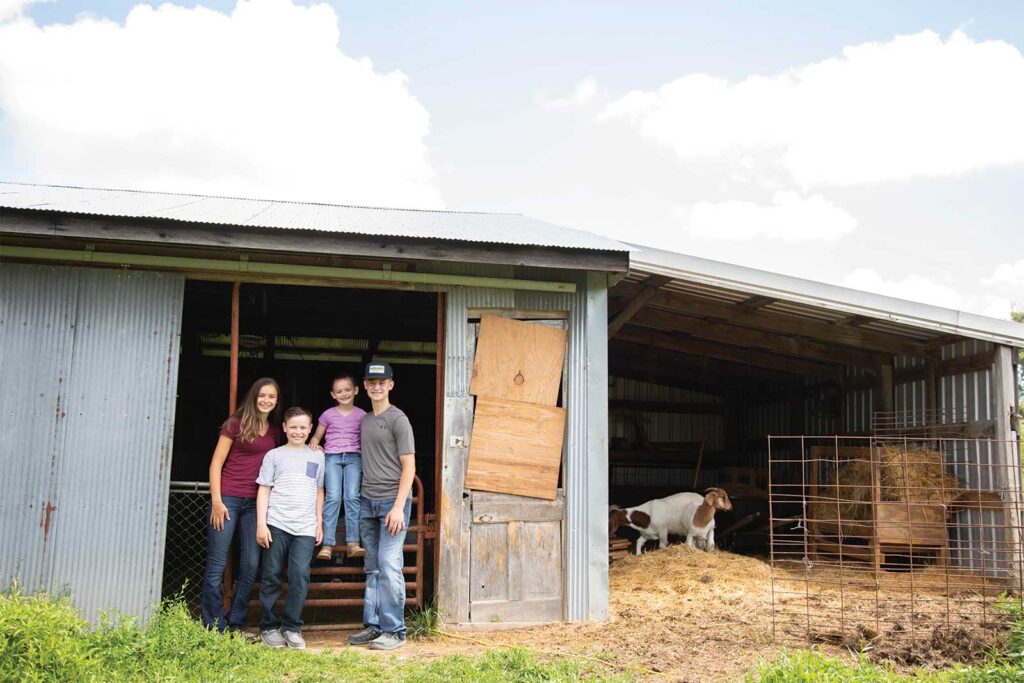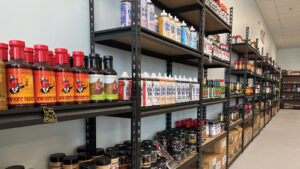4H and FFA provide local youth with real-world experience in agricultural education.
What do outlaw country singer Waylon Jennings, baseball legend Charley Pride, and Kansas City Chiefs kicker Harrison Butker have in common?
While nothing about their professions or hobbies unites them, there is one place where all three have found a home: Wehmeyer Farms. Waylon, Charley, and Harrison are the names of the Wehmeyer children’s show goats.
“We name everything here,” says Honey Wehmeyer. Honey’s children Dawson, 16; Rylee, 14; and Landon, 11, have been raising and showing goats through their local 4H program for the past three years.
Though the Wehmeyers youngest daughter, Leena, 6, can’t show yet, she helps her brothers and sister care for their goats. Not to be left out, Leena participates in the PeeWee 4H program, which she can do until she turns 8 and can join her siblings in their 4H chapter, the Hallsville Go-Getters.
For over 100 years, 4H has provided education and opportunities to kids ages 8 to 18. After joining a 4H club, kids complete hands-on projects under the mentorship of local leaders. The gamut of projects is expansive, with chapters offering everything from cake decorating to robotics to photography. In Columbia and Boone County, livestock and agriculture are particularly popular areas of interest.
“Many of these kids have a passion for agriculture at an early age,” says Boone County Fair livestock chairman and 4H alum Caroline Sicht. “After participating in these 4H programs, many kids naturally join Future Farmers of America,” an agricultural education program for kids in high school and beyond.
Caroline says that there are seven species of livestock that kids can choose from to raise in the 4H livestock program: rabbits, chickens, lambs, goats, pigs, cattle, or dairy cows. All aspects of the animals’ care then become the kids’ responsibility.
“The experiences that FFA and 4H give the kids for the future is second to none,” says Caroline. “Regardless of the type of project the kids participate in, they invest a large amount of time, money, and facilities.”
Each club has project leaders who help the kids learn the basics of the projects. Each leader is specific to a type of livestock and acts as a mentor to the kids as they raise their animals. In the Wehmeyers’ club, Honey is the goat leader.
The Wehmeyer family first joined 4H when Dawson turned eight. They started off simply, curing hams. The family soon decided to attempt their first foray into the agricultural side by raising pigs.
At the time, their farm had become somewhat of a goat rescue. The family often took in goats from people who could no longer care for them and had accumulated about 10 pet goats. Rylee, who had joined the 4H program herself, was the first to hear that there was the option to raise and show goats within their club.
Since their farm wasn’t set up for raising pigs, the family decided that it made sense to focus their projects on what they knew best, and Wehmeyer Hills Meat Goats was born. Now the family breeds their own show goats and supplies them to local 4H kids as well.
The Wehmeyers work almost year-round to ensure their goats are in prime condition for the judges when it comes time for the fair.
“To show, kids must have proof of ownership by February, so they are often caring for their animals throughout the year, starting as early as fall,” says Caroline.
At the Wehmeyers farm, this starts at birth. The siblings all assist as the baby goats, or kids, are born. Leena in particular loves mothering the kids. “They are silly and they jump around all the time,” she says.
Throughout the day, the siblings feed, water, and hay their animals. “4H is a process,” says Rylee. “You have to be diligent in taking care of your animal and working with the people around you.”
Part of the Wehmeyers daily care routine also involves training the goats on how they will walk when it’s time to show. Bracing, or the flexing of the goat’s back muscles, is part of this training, as it prepares the goat to be judged.
Weight is also a critical part of the goats’ care. The Wehmeyer children weigh the goats every Sunday. The numbers often fluctuate, so to keep the goats at the ideal show weight, the siblings specifically calculate the amount of food and supplements each goat gets based on their current weight.
“They eat one and a half to four percent of their body weight, depending on where they are at in the season,” says Dawson. He and his siblings are in charge of getting the supplements and feed as well as providing the correct measurements to each of their goats.
When showing, the animals are broken down into varying divisions from lightweight to heavyweight based on their size. “Heavier goats may sell for more, but that’s not necessarily the goal, since showing is about the muscle mass,” Honey explains.
The goats are additionally categorized by gender: Market wethers are male goats that are bred to be sold for consumption while breeding does are the female goats who are judged based on their reproductive abilities.
On the last evening of the fair, there is an animal auction, so the kids have the opportunity to sell their animals for profit.
“We ask the kids to go out and meet with buyers prior to the market and invite them to come to the fair so [the kids] get the full spectrum of education from caring for the animals to actually selling the animals,” says Caroline.
When a buyer is interested in one of their goats, Dawson says it can be an odd feeling. “You’re around your animal for so long, raising it and taking care of it, so it can be hard to let go sometimes, but it is a business investment,” he says.
If the buyer wants to support a project but doesn’t have use for the animal or can’t care for it, they can return ownership to the kids. The Wehmeyer family has been lucky to have had many of their goats donated back to their farm.
As for the profit, the Wehmeyer children try to save their money for the future. In addition to the financial rewards, all three of the elder Wehmeyer children agree that 4H has broadened their skill sets and contributed to their personal development.
“I’ve grown my leadership skills and helped my community in different ways,” says Dawson. “Since joining 4H, I’ve joined the National Honor Society and I’m in leadership in our FFA chapter.”
When Dawson says “leadership,” he’s actually being humble. “He’s actually the president of our FFA chapter,” says Honey.
Both Rylee and Landon have been brought out of their comfort zones. “There’s a lot of people at the fair that you make connections with,” says Landon.
Rylee adds, “I love the family part of it and all the friends you make and people you meet — 4H has definitely been a blessing in my life.”
This year, the family will be showing their goats at the Boone County Fair in July and will also participate in a few other fairs this summer. The Wehmeyers have high hopes for their goats this year — with namesakes from some of the greats, Waylon, Charley, and Harry are sure to be fierce competition.
You can support the Wehmeyer family and other local 4H kids by attending the livestock shows at the Boone County Fair. This year, the Boone County Fair takes place July 20-24 at the Boone County Fairgrounds.










